🚫 ChatGPT Access Denied: How to Solve Disallowed ISP Issues – A Comprehensive Guide for Beginners
Imagine this: you’re all excited to chat with ChatGPT, OpenAI’s revolutionary AI chatbot, and suddenly you see an “Access Denied” message. Frustrating, right? 😫 Don’t worry! Many people face this ChatGPT access issue, and we’re here to help you fix it, especially if it’s related to a disallowed ISP (Internet Service Provider).
🧩 Why is ChatGPT Access Denied?
The “ChatGPT Access Denied” error, often indicated by Error Code 1020, occurs because ChatGPT’s security system thinks your IP address is suspicious or not allowed. This could be due to various reasons related to your Internet Service Provider (ISP), browser settings, or even a Virtual Private Network (VPN) you might be using.
🔍 Key Reasons for ChatGPT Access Denied Error
- IP Address Blocked: ChatGPT’s security might block your IP address if it detects something suspicious or if your IP is on a blacklist.
- Browser Extensions: Some browser add-ons or extensions might interfere with ChatGPT’s functionality, causing access issues.
- VPN Issues: Your VPN could be providing an IP address that ChatGPT doesn’t accept, leading to a disallowed ISP error.
- Cookies and Cache: Outdated or corrupted data saved in your browser might cause ChatGPT access problems.
- Geographical Restrictions: In some cases, ChatGPT might be restricted in certain countries or regions.
🛠️ How to Fix ChatGPT Access Denied
Don’t worry, beginners! Here are simple, step-by-step solutions to resolve the “ChatGPT Access Denied” problem:
1. 🌐 Use a VPN to Change Your IP
The easiest way to bypass ChatGPT access restrictions is to change your IP address using a VPN (Virtual Private Network). This clever trick makes ChatGPT think you’re accessing from a different, allowed location.
- Choose and subscribe to a trusted VPN service (e.g., NordVPN, ExpressVPN, or Surfshark).
- Download and install the VPN application on your device.
- Open the VPN app and log in with your credentials.
- Connect to a server in a different location (preferably in a country where ChatGPT is known to work).
- Once connected, try accessing ChatGPT again through your web browser.

2. 🍪 Clear Browser Cookies and Cache
Old cookies and cached data in your browser might be causing the ChatGPT access issue. Clearing them can often solve this problem and improve your browsing experience.
- Open your web browser’s settings or preferences.
- Navigate to the ‘Privacy and Security’ section.
- Find and click on ‘Clear browsing data’ or a similar option.
- Select ‘Cookies’ and ‘Cached images and files’ (you may also choose other data types).
- Set the time range to ‘All time’ for a thorough cleanup.
- Click ‘Clear data’ or ‘Clear now’ to remove the selected items.

3. 🚫 Disable Browser Extensions
Some browser extensions can interfere with ChatGPT’s functionality, potentially blocking your access. Temporarily disabling them might resolve the issue.
- Open your browser’s extension or add-on management page.
- Locate the list of installed extensions.
- Disable all extensions by toggling them off.
- Try accessing ChatGPT again.
- If it works, re-enable extensions one by one to identify the problematic one.

4. 🔄 Reset Network Settings
Sometimes, resetting your network settings can resolve IP-related issues and help you regain access to ChatGPT.
- Press the Windows key + X and select “Windows PowerShell (Admin)” or “Command Prompt (Admin)”.
- In the window that opens, type
ipconfig /flushdnsand press Enter. This clears your DNS cache. - Next, type
netsh winsock resetand press Enter. This resets the Winsock catalog. - Restart your computer to apply the changes.
- After restarting, try accessing ChatGPT again.

5. 📞 Contact OpenAI Support
If none of the above solutions work, it’s time to reach out to OpenAI’s support team. They can help you get to the bottom of the ChatGPT access denied problem and provide specific guidance.

💡 Handy Tips to Avoid Future ChatGPT Access Issues
- Always use a trusted and reliable VPN service when accessing ChatGPT.
- Regularly clear your browser cookies and cache (at least once a month).
- Be cautious when installing browser extensions and avoid using suspicious ones.
- Keep your browser, operating system, and security software updated to prevent potential security issues.
- Consider using a dedicated browser profile for ChatGPT to isolate it from other browsing activities.
❓ Frequently Asked Questions (FAQs) about ChatGPT Access Denied
1. Why Does My VPN Not Work with ChatGPT?
Sometimes VPNs use IP addresses that are flagged or blocked by ChatGPT. If this happens, try the following:
- Switch to a different server location within your VPN app.
- Try a different VPN protocol (e.g., switch from OpenVPN to IKEv2 or WireGuard).
- If possible, use a dedicated IP address provided by your VPN service.
- As a last resort, try temporarily disabling your VPN to see if it’s the cause of the issue.
2. Can My Browser Extensions Cause ChatGPT Access Denied Errors?
Yes, certain browser extensions can interfere with ChatGPT’s access permissions. Common culprits include:
- Ad blockers and privacy-enhancing extensions
- VPN or proxy extensions
- Script blockers or content modifiers
To troubleshoot, try disabling extensions one by one or use your browser’s incognito/private mode, which typically disables all extensions.
3. How Often Should I Clear My Browser Cache to Prevent ChatGPT Access Issues?
It’s a good practice to clear your browser’s cache and cookies at least once a month to prevent various issues, including ChatGPT access errors. However, if you frequently encounter problems, you might want to clear your cache more often or set your browser to clear cache and cookies automatically when you close it.
4. Is It Safe to Contact OpenAI Support About ChatGPT Access Problems?
Absolutely! The OpenAI support team is there to help you resolve any issues you face with ChatGPT. They have dedicated channels to assist users and maintain the privacy and security of your information. When contacting support:
- Provide a clear description of the error you’re encountering.
- Mention the steps you’ve already tried to resolve the issue.
- Include any error messages or screenshots if possible.
- Be patient, as response times may vary depending on the volume of requests.
🎉 Wrapping Up: Solving ChatGPT Access Denied Issues
Experiencing the “ChatGPT Access Denied” error can be frustrating, especially when it’s related to a disallowed ISP or other technical issues. However, with the steps and solutions provided in this guide, you’re now equipped to tackle this problem head-on!
Remember, whether it’s changing your IP with a VPN, clearing old cookies, disabling problematic extensions, or resetting your network settings, these troubleshooting steps can help you regain access to ChatGPT and continue enjoying its amazing capabilities. And if all else fails, don’t hesitate to reach out to OpenAI’s support team for personalized assistance.
Stay persistent, follow the steps carefully, and soon you’ll be back to chatting with ChatGPT, exploring its vast knowledge, and unleashing your creativity. Happy chatting, and may your AI conversations be smooth and uninterrupted from now on! 🚀💬

